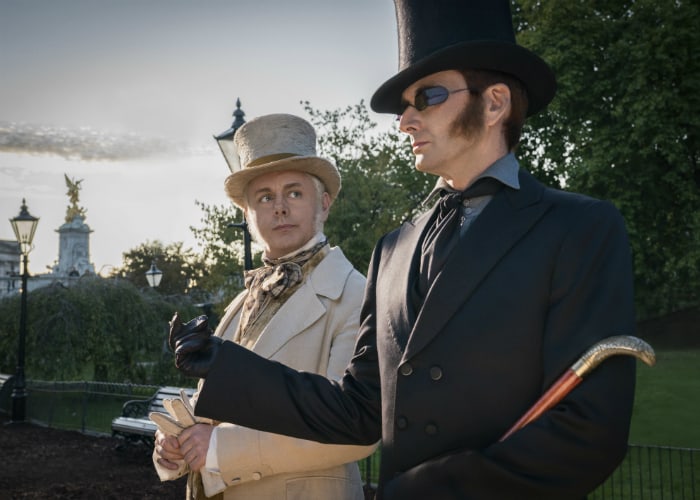Nearly 30 years after its publication, Neil Gaiman and Terry Pratchett’s beloved novel about the end of the world is getting its first adaptation as a six-part miniseries, released in Britain by BBC Two and the US by Amazon Prime.
This comes just two years after the first television adaptation of American Gods, another of Gaiman’s novels, and while that series has its own dreamlike, bizarre charm, Good Omens feels much more like a “true” adaptation. It’s very silly, it’s very light, and it’s very… English.
It also stays remarkably close to the book. Given that the bulk of the story takes place over a single week, and all of it has been carefully and accurately foretold in a book of prophecy, it probably makes sense not to stray too far.
But that faithfulness sometimes works against the show, as it breezes through elements that are clear in the book with perhaps too light a touch, relying on the merits of an idea to carry a scene that could really benefit from a few more narrative touchstones. Having read the novel, I knew why Death was playing a trivia arcade game and Tibetans were suddenly appearing in tunnels under England, but I’d be curious to know how much someone unfamiliar with the story took in.
The only place where the show deviates especially far from the book is in its treatment of Aziraphale and Crowley, an angel and a demon who’ve been living on earth since the beginning and have gone a little bit native… so much so as to actually become good friends.
And in a complete upset of the usual book reader’s lament, I can say this departure from the novel is the very best part of the adaptation.

Crowley and Aziraphale (David Tennant and Michael Sheen, respectively) are critical players in the book, it’s true, but in the miniseries, they are the stars. We see the chronicles of their interactions throughout millennia and focus more on their present relationship and general botching of Armageddon. Jon Hamm is a lovely addition as a disarmingly cruel Archangel Gabriel with a perpetual rictus and dead, purple eyes, but it’s hard not to see him as an excuse to give Sheen’s angel more opportunities for screen time.
In fact, the whole rest of the series, while humorously, carefully, and faithfully done, lumbers on a bit. The who’s who of comedians gets a little too unwieldy, and the dialogue a bit too contrived, and you find yourself counting down the minutes until Tennant and Sheen come back.
And when they do, it’s magic. Sheen embodies the angel Aziraphale’s sweet, flustered fastidiousness body and soul. And Tennant’s Crowley delivers all his lines with a weedling, waffling, trailing off that just screams rationalization — the perfect choice for a professional tempter, and one that provides much finer characterization than a set of (admittedly cool) yellow snake eyes ever could.
But while the two fit their written counterparts beautifully (and boy do they ever look the part), it’s where they go the extra step as living, breathing characters that they shine. Aziraphale, an old fashioned aesthete with a contagious joie de vivre, has a desperate and concerned suspicion about the state of the forces of Good. And Crowley, a demon who loves leather clothes, fast cars, and slouching not because he’s evil but just because they’re cool, has a much stronger moral compass than anyone Heaven is able to produce. (We do see him give some houseplants a very firm talking to, though).
In short, with their little quirks and interests, their questioning of authority, and their anxious muddling against all odds, our angel and demon come off as more human than any of their earthly counterparts. They feel more real. This is due in part to the script — with more to work with, more time to do it in, and a more complete understanding of what’s at stake, they’re the characters it’s easiest to empathize with. It’s a smart choice to focus more on them, and I’m glad the show did it.
But a lot of the credit goes to Tennant and Sheen, and the undeniable chemistry between the two. Aziraphale and Crowley are a lot of fun on their own, but together they’re mesmerizing. Their distinct styles play beautifully off each other in a way that connotes real, spontaneous affection. You believe that these two have been bickering, laughing, and supporting each other since the dawn of time.
Faithful as their interpretations may be, the rest of the series’ players fall a little short. Anathema Device, Adam Young, Newt Pulsifer, and all the rest feel like characters in an offbeat story. And there’s nothing wrong with that. It’s to be expected. But Aziraphale and Crowley feel like People with a capital P — a pair with aspirations, motivations, and six thousand years of history that can be read behind even the smallest of interactions.
Good Omens is worth watching for the dry, witty, madcap style of a thoughtfully put together Gaiman/Pratchett universe. It’s worth remembering for the exultant, nuanced performance of its two main characters.
It debuts on Amazon Prime on Friday, May 31st as a six-part miniseries. Give it a shot.
The post There’s Lots to Like in ‘Good Omens’ But Tennant and Sheen Are What’s to Love appeared first on Film School Rejects.
from RSSMix.com Mix ID 8320810 http://bit.ly/2JGXEVV
No comments:
Post a Comment